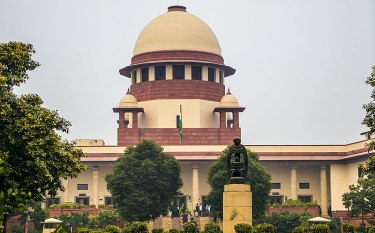
The Supreme Court on Monday issued notice to the Rajasthan government on two public interest litigations challenging the constitutional validity of the Rajasthan Prohibition of Unlawful Conversion of Religion Act, 2025.
A bench of Justices Vikram Nath and Sandeep Mehta called for the state government’s response within four weeks on the petitions that contest several provisions of the Act, which came into force last month after being passed by the state assembly in September. The bench has posted the matter for hearing after four weeks.
The petitions, one filed by advocate and researcher M Huzaifa and veteran human rights activist John Dayal, and another by Dashrath Kumar Hinunia, specifically challenge Sections 5(6), 10(3), 12, and 13 of the Act. These provisions empower executive authorities to confiscate and demolish private properties linked to cases of unlawful religious conversion even before any judicial determination of guilt.
During the hearing, the bench questioned the petitioners, asking, “Why are you aggrieved by this enactment?” The court also enquired why the petitions were not filed before the Rajasthan High Court.
Senior Advocate Huzefa Ahmadi, appearing for one of the petitioners, informed that similar pleas challenging the validity of anti-conversion laws of several states are pending in the apex court. He described Rajasthan’s anti-conversion law as “the most egregious” compared to similar Acts passed by other states. He pointed out that the fines for mass conversion, defined as converting more than two people, are “mind-boggling” and can reach up to Rs 20 lakh. The punishment under the Act ranges from a minimum of 20 years to life imprisonment.
The petitioners have also sought a stay on the operation of the Act pending final disposal of the plea.
Speaking to Christian Today Dr. John Dayal said, “This law is a chilling example of how the state seeks to bypass the judiciary entirely. By empowering servile and possibly ideologically committed to Hindutva bureaucrats to demolish homes and seize property on mere allegations, Rajasthan has codified the very bulldozer justice the Supreme Court condemned last year. The provisions grant sweeping powers to administrative officers while minorities and marginalised communities face the prospect of losing their homes . The Apex Court must protect constitutional freedoms before they’re buried under the rubble of executive whim.”
The controversial provisions under challenge include Section 5(6), which allows property where unlawful conversion has taken place to be forfeited after an inquiry by any gazetted officer appointed by the District Magistrate or State Government. Section 10(3) empowers the state government to cancel the registration or licence of institutions found violating the Act, confiscate their property, freeze financial accounts, and impose a penalty of Rs 1 crore.
Section 12 makes properties where illegal conversion or mass conversion has taken place liable to be forfeited and confiscated by the District Magistrate or any appointed person after holding an inquiry. Section 13 deals with demolition of illegal constructions on such properties, providing for demolition after inquiry by any gazetted officer, with only a show cause notice of 15 days or as per local municipal laws.
The petitioners argue that these provisions amount to punitive demolitions and collective punishment, violating fundamental rights under Articles 14, 21, 22, and 300A of the Constitution. They contend that by empowering administrative officers to carry out demolitions and forfeitures without trial, the Act usurps judicial powers and undermines the rule of law and separation of powers.
The petitioners also assert that the Act contradicts the Supreme Court’s 2024 judgment prohibiting extrajudicial demolitions. They warn that such measures disproportionately affect minority and marginalised communities, threatening their right to shelter, livelihood, and due process.
The law prescribes imprisonment for 20 years to life for mass conversions through deception and a jail term of seven to 14 years for conversions by fraudulent means. Conversion of minors, women, Scheduled Castes, Scheduled Tribes, and persons with disabilities through deceit would attract a jail term of 10 to 20 years and a fine of at least Rs 10 lakh.
In September, another Supreme Court bench had sought the stand of several states on pleas seeking a stay on their respective anti-conversion laws, including those enacted by Uttar Pradesh, Madhya Pradesh, Himachal Pradesh, Uttarakhand, Chhattisgarh, Gujarat, Haryana, Jharkhand and Karnataka. The top court had made clear that it would consider the prayer for staying the operation of such laws once the replies were filed.




